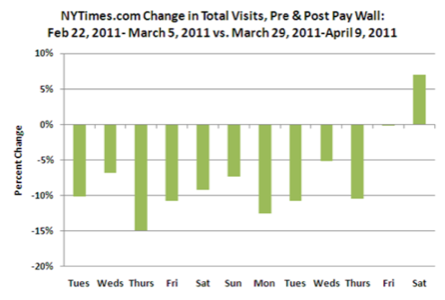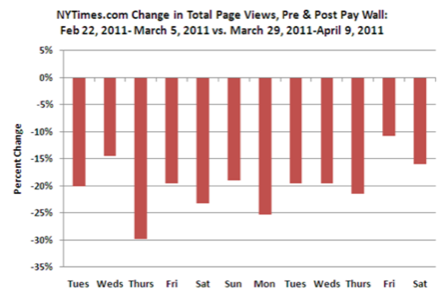
At the end of March, The New York Times finally activated the paywall that it had announced a year earlier. The publication took a “porous” approach to charging users, letting readers access up to 20 articles a month for free and allowing for links from social networks like Facebook or Twitter to pass through without counting. Still, onlookers have wondered what the effect of the wall would be on the site.
According to Web traffic measurement firm Hitwise, the numbers are in and traffic has certainly dipped in the nearly two weeks since the wall was put in place.
Hitwise examined traffic to the New York Times website according to two metrics, visits and pageviews, by comparing the 12 days prior to the pay wall to the 12 days after.
While pageviews are defined as any time that page is loaded, even if multiple times by the same person, visits are broken into “sessions”, so if the same person visited the site once in the morning and then once later that day, it would count as two visits. Browsing a number of pages in a short period of time, however, would equal one visit but multiple pageviews.
So what were the results? According to Hitwise, the site has seen “a decrease in the overall visits between 5% and 15%” and “a decline in total page views which ranged between 11% and 30%.”


Hitwise notes the general decline in visits, speculating that the reason for the increase on Saturday, April 9, was “likely due to visitors seeking news around the potential government shutdown and ongoing budget discussions.”


Similarly, pageviews decreased by anywhere from 11% to 30%. Surely, none of this is as bad as the now-fabled implementation of a paywall by the Newsday, however, which resulted in just 35 subscriptions in the three months after it was put in place.
Hitwise also points out that networks like Facebook and Twitter could be used as a clever way to workaround the paywall, but that “to date there has not been a significant difference in the share of upstream traffic from both search and social networks to NYTimes.com before and after the launch of the paywall.”
Disclosure: ReadWriteWeb is a syndication partner of the New York Times Technology section.

















